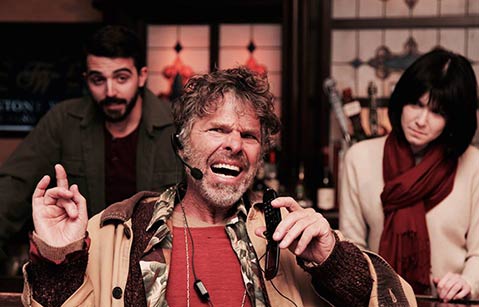Bar Talk
The Producing Unit Presents 'Yankee Tavern'

Some of the most interesting, curious conversations happen in bars. With alcohol to fuel theories, passions, and decisions, certain types of ale houses — area watering holes and gritty dives, particularly — are places of everything outside polite, daytime dialogue, from extreme honesty to booze-fueled blarney. The interesting aspect of these conversations is picking out puzzle pieces of rationality and determining if the discourse is one of philosophical insight with a beguiling stranger or the blathering of a random drunk. Peter Frisch and The Producing Unit bring this concept to Center Stage Theater on Friday, May 13, in Stephen Dietz’s Yankee Tavern, a provocative play that conveys the emotional chaos of uncertainty and highlights how the small subterfuges of everyday life can have a lasting effect.
Yankee Tavern in New York City is a dubious bar filled with questionable people. Dietz’s play features what director Frisch describes as colorful characters and relationships, even if the true nature of everyone’s particular motive is obfuscated. The production features Charlie Rohlfs and Hayley O’Connor as Adam and Janet, a young couple who inherited the bar from Adam’s deceased father. Bill Egan brings his aptitude for character acting to the role of Ray, a conspiracy theorist who’s thoughts on subjects such as the JFK assassination might be benign, but in a world about five years removed from the attack on the World Trade Center, his theories about a 9/11 conspiracy cannot be dismissed so easily. Though somewhat belligerent, Ray’s eccentric views highlight the philosophies of the play, including, as Frisch points out, the importance of questioning authority and developing opinions based on research and knowledge rather than blind trust (or distrust).
The cast is rounded out by Joseph Bottoms as a mysterious man who orders a beer for himself and an invisible friend. Frisch calls Bottoms’s performance very out-of-the-box, a rough-hewn character inspired by Tom Waits-esque gruffness and shrewd, enigmatic dynamism. Yankee Tavern invites the audience to be seduced by an atmosphere of distrust — to consider a less obviously rational point of view.
Frisch chooses plays for The Producing Unit that present characters who suffer from problems specifically associated with the contemporary world, and government distrust, convoluted conspiracy theories about terrorists, and a general unease about national security are indicative of a particular point in recent history, one that has directly shaped the current social climate. Yankee Tavern is a dark comedy that illustrates the effects of uncertainty and fear. It offers moments of laughter, but Frisch describes the show more precisely as a comedy via audience empathy. The characters in Yankee Tavern have secrets, and when the truth and theories and lies collide, they create moments of epiphany as the mysteries in the room unravel.
Dietz is a playwright known for his layered and intricate writing style, and Frisch describes the material as thought-provoking and challenging for audience and performers alike. Despite certain overt comedic moments, a subtler style of comedy pervades the production, and Yankee Tavern also hits notes of high-intensity drama. Suspicion and secrets are ever-present, existing like an unseen character, and become more obvious as the narrative hurls toward conclusion. Yankee Tavern is more than a barroom drama of eccentric drinkers; it’s theater that presents audiences with controversies, fresh and known, to consider after the curtain falls.
4·1·1
Yankee Tavern runs Friday, May 13-Saturday, May 21, at Center Stage Theater, 751 Paseo Nuevo. Call (805) 963-0408 or see centerstagetheater.org.



